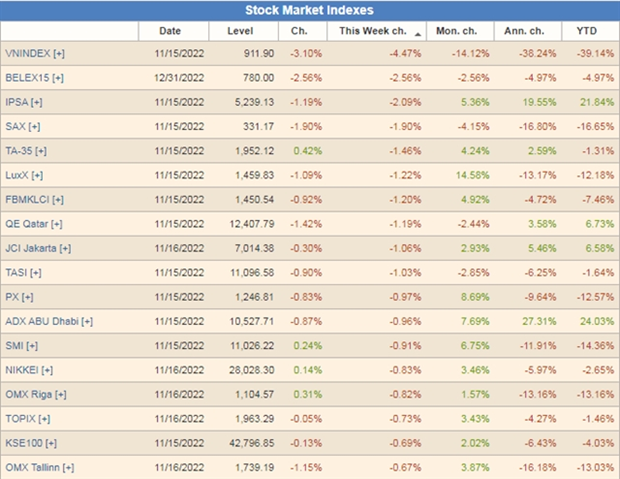Vietnamese stock market loses 20.2 billion USD in first half of November
The Vietnamese stock market has just closed the first half of a rough November with a forgettable session. Selling force weighed on most of the industry groups, with the whole market recording nearly 400 stocks hitting floor prices.
 Global stock indices movements as of November 15. (Photo: countryeconomy.com)
Global stock indices movements as of November 15. (Photo: countryeconomy.com)The market benchmark VN-Index finished November 15 at 911.9 points, a decline of 3.1% from the previous day's level. This was the lowest in more than 25 months since October 5, 2020.
A drop of 3.1% made the country's stock market the biggest loser in Asia on November 15. Most of the major markets in the region such as Japan, China, and the Republic of Korea, have recovered well recently. However, the positive effect did not influence the Vietnamese stock market, according to cafef.vn.
Since the beginning of November, the benchmark has lost another 116 points, equivalent to a decrease of 11.3%. The losses were approximately the fall of the whole September, when the index dipped the most in 31 months since it hit the bottom during the COVID-19 pandemic period.
The market was even the world's worst performer in a week, a month, a quarter, six months, and a year, since the beginning of the year, and from the peak.
The sharp fall since the beginning of November caused the market to lose 463 trillion VND (19.6 billion USD) in market capitalisation on the Ho Chi Minh Stock Exchange (HoSE). In just half a month, the market dropped more than 500 trillion VND in market capitalisation on three exchanges. Compared to the peak in early April, the loss even reached nearly 2.68 quadrillion VND.
The market was in a bear state amid a wave of margin calls of many real estate business leaders, casting a shadow on many stocks. The sell-off activities created a domino effect, causing a number of stocks to hit floor prices.
Despite the strong corrections, bottom-fishing demand remains weak as a part of cash flow has been disbursed to production. Higher interest rates also stimulated more investors to shift to less risky assets like bank savings. Moreover, the tightening management of corporate bond issuance activities and limited credit room somewhat affected the stock market's sentiment.
Looming sentiment dragging the market's liquidity to the lowest level since the beginning of 2021 with the average matching value on HoSE less than 8.7 trillion VND. There are no longer billion-dollar trading sessions like the boom period one year ago, but more and more sessions below 10 trillion VND.
At that time, cash inflows from foreign investors became a highlight as they continuously net bought during the period. From the beginning of November until now, they net bought more than 6.2 billion VND on HoSE alone, the largest figure in recent months. Earlier this year, they net sold nearly 4.2 trillion VND.
Capital flows from East Asia and Thailand continue to play an important role in attracting foreign investors to return to the market. Outstanding passive funds such as Fubon ETF and Diamond ETF continuously attract money with a value of hundreds, even trillions of dong. In addition, well-known foreign funds like Dragon Capital and VinaCapital also showed signs of disbursing recently.
The attractive valuation of the Vietnamese stock market is one of the appealing factors to foreign investors. Data from Bloomberg showed that the VN-Index's price to earning ratio (P/E) is currently at 9.4x, even lower than the bottom hit at the end of March 2020 and equivalent to the bottom during the 2011-12 crisis.
Although short-term difficulties are inevitable, Dragon Capital believes that many risks have been priced-in and the market valuation is in a very attractive area.
Similarly, ACB Securities Company (ACBS) also assesses that the VN-Index still maintains a greater attraction for long-term investors compared to peer-to-peer markets with P/E of 9.8x.
SGI Capital believes that the market has been at the oversold zone corresponding to the historical cheap valuation area.
“The nature of the stock market is always volatile and difficult to predict in the short term, investors who can overcome the current crisis will reap great results when the market and the economy return to the growth cycle," said the investment fund./.













